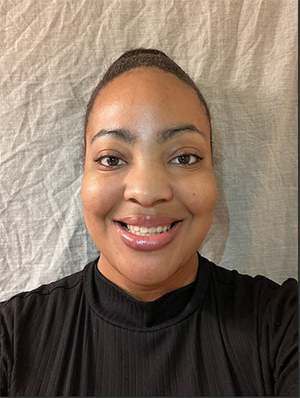“Even if you don’t have a lot of experience with the classes––even if you’re just starting out––I feel like if you just at least start with Intro to Cybersecurity, that will give you an excellent baseline on how to move forward and navigate in the competition in general.”

This week on the Coastline blog we are highlighting Coastline student and NCAE Cyber Games competitor, Precious Webb!
Back in March, Precious and her team competed in the NCAE Cyber Games, a cybersecurity competition for first-time competitors, with aid from Professor Andrea Barrios. “Professor Barrios was an excellent asset and our team succeeded due in large part to her guidance," Precious says.
While this was her first time competing, the knowledge Precious gleaned and applied with her team from the start of her experience competing to the finish demonstrates her willingness to learn, grow, and expand her experience in the cybersecurity landscape!

Coastline student & NCAE Cyber Games winner, Precious Webb.
(image provided by Precious Webb.)
Background in Cybersecurity
The NCAE Cyber Games was Precious’s first time competing in a cyber competition. After becoming aware of the games through an email from Professor Tobi West, Precious decided to create the team herself over winter break, making her team leader. “…By happenstance, people just reached out to Professor Barrios and Professor West, and that’s how it was formed.” She says. “It was other people reaching out to the professors, and then they’re like, oh this person is interested, this person is interested.’”
Though cybersecurity has been an interest of hers for the past two years, she considers herself a “complete novice” in the subject. “As I was looking into it, just seeing the background of it and seeing different aspects of cybersecurity, I was like––this is really interesting. So let me see, how else can I delve into it.” She says the games were an opportunity for her to get her hands dirty, and though it was nerve-wracking, she regards the games as a great experience.
Precious had already taken Intro to Cybersecurity, along with a few other classes when the competition started, which shaped her cybersecurity knowledge and prepared her for the games, she says. “…We had a lot of labs during those classes that were similar to our environment.” She explains. “The virtual labs using the command line, using servers, understanding routers…If I didn’t take those classes, I don’t think I would have even been able to do anything during the competition. It helped me immensely. Even if you don’t have a lot of experience with the classes––even if you’re just starting out––I feel like if you just at least start with Intro to Cybersecurity, that will give you an excellent baseline on how to move forward and navigate in the competition in general.”
Explore Cybersecurity Programs @ Coastline
Preparation Process
Once the team was formed, Precious and her team had a lot of meetings through Discord and Zoom to prepare for the cyber games. “We did a lot of the practice on the NCAE website with the sandboxes,” she says, “which is kind of a virtual environment, a practice environment for what the competition would look like…It’s a lot of outside research. A lot of network topology, understanding networks, understanding the command line. Although the sandboxes were not exactly the same as the competition day, it was very similar.”
Figuring out what they should focus on as a team made the process easier to navigate, and improved their communication, she says. “I would say just really practicing with that and then meeting a lot with your team online and discussing what are your strengths, what your weaknesses? What should we focus on? Watching a lot of videos––It’s just a lot of outside resources all combining into one and just learning as you go.”
On the day of the competition, the focus was placed more on who was comfortable with handling what, instead of delegating specific tasks. “…During the competition, a lot of my teammates felt a lot more comfortable with the command line. So, we would say, ‘OK, you can work on this network box, you can work on the router.’”
With that, Precious advises beginners to establish delegating and communication within their team meetings, which she feels they could have done more of. “…With people that are just beginning within the competition––just making sure you’re really communicating with your team, what you feel comfortable with, and then focusing on that. I think if we focused on that a lot more, it would have been even smoother during competition day.”

Competition Experience and Support
Precious attributes a large part of the team’s success to the guidance they received from Professor Barrios. Being new to the cybersecurity landscape, there were things she struggled with such as networking, and how data moved within a system. However, Professor Barrios was readily available in every team meeting and willing to answer their questions. “She didn’t make you feel like, ‘Oh, you should know this already.’” Precious says. “She made you feel very comfortable with being brand new. She was very, very encouraging and she just kept saying, ‘You guys, this is our first time and we’re all in this together.’ It was just so comforting to hear that. She played an excellent role in that.”
Having never competed before, Precious was understandably nervous and began to doubt herself, questioning her abilities due to her beginner status. Voicing her concerns to Professor Barrios and receiving her reassurance was essential to her mindset before and during the game. “…She would just say, ‘It’s okay. This is a learning experience.’ And just going into it as a learning experience and not, 'We need to get first place and we have to be the best.’ That’s what really helped us a lot.”
Learn More About the CAE-CD Cyber Center @ Coastline
Team Dynamics and Shared Leadership
Though Precious was the team leader, for her, it was just a title. She didn’t feel like she was the head of the team, but instead felt like the entire team was leading, with every member contributing to the team’s success in their own ways. “…We all built within one another. So, I never actually went into the competition saying, ‘I’m the team leader, I’m going to guide us through.’” She explains. “I was thinking, ‘You know what, I’m going to encourage my team. I’m going to do the very best that I can to make sure that we’re all communicating. What’s your schedule? How can we meet up? What can I do to help you?’ That’s how I went into it. Not like, ‘I’m the team leader and I’m going to take over and I’m going to make sure that we’re doing well.’ It was a lot. It was a group effort overall.”
The aspect Precious found integral to having a great experience as a team was ensuring they were having fun during the competition and had an open line of communication throughout. “That was the biggest aspect of it. I feel like if we were not having fun and if we were not willing to communicate and be honest with one another––I think it would have been a really, really, difficult experience. Especially since it’s all online, we’re not next to each other, I can’t reach out and look over my team’s shoulder. We’re all online. So that was the most integral part of it. It’s very cliché, I know, but that was the best part of it.”

Advice to Future First Timers
To future first-timers, Precious emphasizes that the first thing you need to do is take a deep breath and relax. “If you overanalyze everything and try to relearn every single thing like, ‘I need to learn the command line, I need to learn networking. I don’t have any skills in programming. What can I do?’ Don’t worry about it. Take a deep breath and breathe.”
Attending all of your team meetings along with communicating with your professor and teammates is crucial to your success in the competition, she says. “…You have to communicate because if you don’t communicate anything, you are going to struggle a lot in a competition. You need to really hone in on your communication skills for the technical aspect.”
Networking skills, she adds, are important to focus on before heading into the competition. “…Understand how data moves to and from the networks and also understand the command line, specifically in Linux. That was our environment. Once you understand the basics and the foundations of that, you will do very well in the competition.”
Congratulations to Precious, Professor Barrios, and the rest of the team on the win!